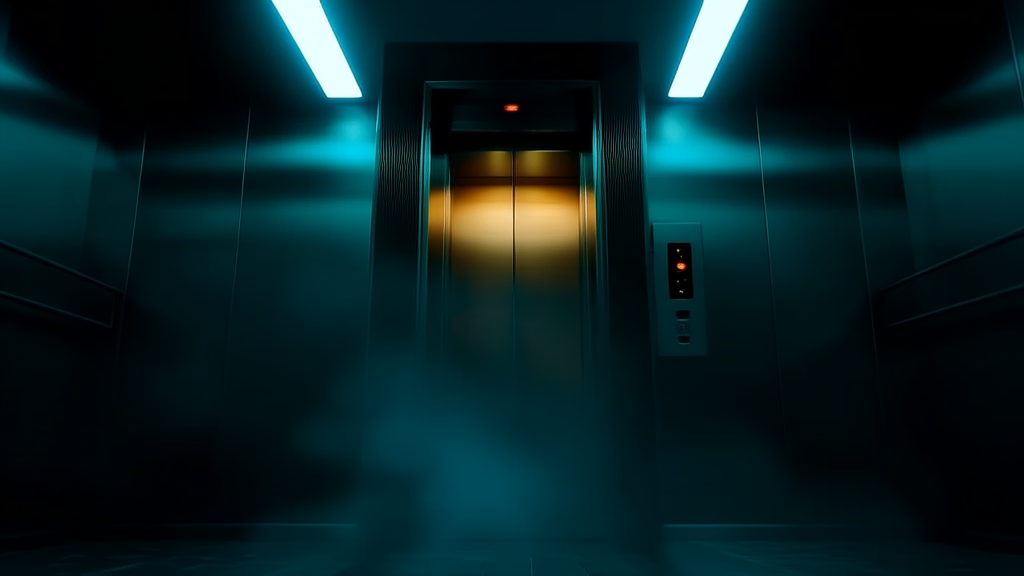🔮 Weird Tales & Urban Legends
The Elevator Never Stopped Mid-Rise—But the Voices Always Did

The elevator was always the first thing to go when the power failed. No one knew why, but in the old building where the offices were housed, the lift would stop mid-rise, its lights flickering like a dying breath. Most people just waited, but some swore they heard voices—soft, whispering, and never quite loud enough to make out.
Lena had been working at the company for three years, and she’d never paid much attention to the rumors. She was a data analyst, not a ghost hunter. But on her way home one rainy evening, the power cut out, and she found herself trapped between floors 7 and 8. The emergency light glowed faintly, casting long shadows that seemed to move even when no one was there.
She pressed the button for floor 1, then again. Nothing. She tried the emergency call button, but all she got was static. Then came the voice. Not from the speaker, but from behind her. A woman’s voice, calm and soft, saying, “You’re not alone.”
Lena turned slowly, expecting to see someone. But the elevator was empty. Just her and the flickering light. She stepped back against the wall, heart pounding. “Who’s there?” she asked, her voice barely above a whisper.
The voice didn’t answer. Instead, the elevator shuddered, and the doors creaked open slightly, as if something had pushed against them from the other side. Lena froze. She could feel the air change, thick and heavy, like the building itself was holding its breath.
When the lights came back on, she was still in the elevator, but the numbers on the panel had changed. It now read "9" instead of "7." She stared at it, trying to remember if she had ever been on the ninth floor. She hadn’t. But as she reached for the button, she noticed something strange: the numbers were written in red ink, and the letters were slightly crooked, as if written by a child.
The next day, Lena told her coworker about the incident. He shrugged it off, but later that week, he mentioned that he had once seen a man in the elevator who wasn’t supposed to be there. “He was wearing a suit, but his face was all wrong,” he said. “Like it was stretched or something. I didn’t tell anyone. I don’t want to get fired.”
Lena started noticing more things. The elevators made strange noises when no one was inside. Sometimes, the buttons would press themselves. One morning, she saw a reflection of a woman standing behind her in the mirror of the elevator, but when she turned around, no one was there. The woman’s eyes were wide, her mouth open in a silent scream.
She began to research the history of the building. It had been built in the 1920s, and during the Great Depression, several workers had died in accidents. Some claimed the building was cursed, that it absorbed the energy of those who perished within its walls. Others believed it was just an old building with bad wiring and poor maintenance.
One night, Lena decided to stay late to finish her work. As she entered the elevator, the doors closed automatically, and the light went out. This time, the voice was louder. “You shouldn’t have come back,” it said. “You don’t belong here.”
She pressed the button for the ground floor, but the elevator didn’t move. Instead, the lights flickered, and the numbers changed again. This time, it read "13." She felt a chill crawl up her spine. She had never seen a thirteenth floor in this building.
Then, the doors opened. Not to the lobby, but to a dark hallway lined with old, dusty windows. She stepped out, and the doors shut behind her with a soft click. The hallway was silent, except for the sound of her own breathing. She walked forward, unsure of where she was going, but driven by a need to understand.
At the end of the hall, there was a door. It was slightly ajar, and inside, she saw a small room filled with old files, photographs, and a single desk. On the desk sat a typewriter, its keys worn and faded. A photo lay on top of it—a group of men in suits, smiling, but their faces were blurred.
As she reached for the photo, the room suddenly filled with a low hum, and the lights flickered again. The voice returned, softer this time. “You’ve seen too much.”
Lena backed away, her heart racing. She ran back to the elevator, but when she reached it, the doors were gone. In their place was a wall, smooth and unbroken. She pounded on it, shouting for help, but no one answered.
Days passed, and Lena disappeared from the office. Her coworkers said she had quit, but no one had seen her leave. The elevators still worked, but the numbers had changed again. Now, they read "E" instead of "7."
Some say that if you ride the elevator at midnight, you might hear the whispers again. Others claim that if you press the wrong button, you might never come back. But no one has ever confirmed it.
And so, the building stands, waiting. Watching. Listening. Because sometimes, the elevator doesn’t just take you up—it takes you somewhere else entirely.
Published on en
🔗
Related Sites
- AI Blog — AI trends and tech news